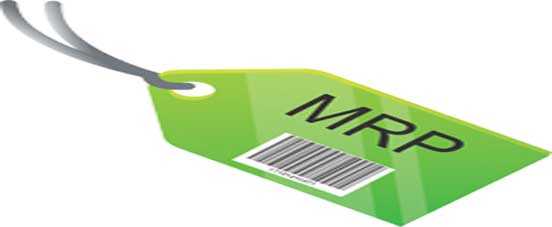- Articles ›
- Marketing and Strategy ›
- M.R.P: Setting your own price ? Articles
M.R.P: Setting your own price ?
Money- the one factor which keeps humans on their toes. Be it individuals or organisations, any opportunity to charge and earn an extra penny is not allowed to let go. But sometimes naive customers are charged for something which is far more than the value associated with the product. This is why the concept of Maximum Retail Price was introduced. However, is MRP for real or do people set their own prices?

The basic phenomenon of demand and supply in an economy sets the price for any product. If in an open market, supply is more than the demand, then the price of product is lesser, and on the other hand if supply is limited for more demand, the price of the product is higher. Companies often misused the latter factor, and charged huge amounts for their products as they wished. Thus, the goverment intervened and ordered companies to set a maximum retail price for all its products, so that any unfair trade practice is avoided. However, inspite of being illegal, people charge more than the stipulated MRP.
Theoretically, people and companies are bound by selling the products at less than or equal to the MRP. Failure to do so, would be against law, and would be liable for punishment. Ethical marketing practices if violated can be a problem for the companies. But reality showcases a different picture altogether.
In real life, a street urchin sells a packet of wafers for 50% more than the price, and a soft drink with a premium over the MRP. The little boy has no other option as he too has to give a bribe or 'hafta' to the local policeman, if he has to survive in that locality. Similarly,from selling water bottles at higher prices at railway stations to charging premium over MRP at hotels and hillstations is illegal, yet it is practised. Thus, in this case the seller and the buyer, who doesn't think much about spending a petty more, set their own price, which is unlawful.
Similarly, even retailers are a part of this illegal practice. Many retailers sell a box of chocolates at a higher price individually, even though clearly mentioned by companies 'not to be sold loose'. But by doing so, both buyer and seller don't have any issue, thereby leading to the mockery of law.
Such illegal practices are by far and large active in semi urban and rural areas. And little can be done to stop them as both the buyer and the seller are the culprits. On the contrary, even if a buyer is against this practice, the amount of pressure, time and effort to fight this malpractice is so much, that he decides not to support the law.
For all these above malpractices, manufacturing companies, retailers and even individuals are responsible and can face the wrath of law. Hence, companies should ensure that such illegal practices are controlled, as it is unethical and may lead to an unexpected retaliation by the customers. But the risk of bending the rules and earning a little more, results in breaking the MRP barrier.
The article has been authored by the editorial team. The content on MBA Skool has been created for educational & academic purpose only.
If you are interested in writing articles for us, Submit Here
Share this Page on:
What is MBA Skool?About Us
MBA Skool is a Knowledge Resource for Management Students, Aspirants & Professionals.
Business Courses
Quizzes & Skills
Quizzes test your expertise in business and Skill tests evaluate your management traits
All Business Sections
Write for Us